By Fr. Jerry Pokorsky ( bio – articles – email ) | Oct 26, 2020
Many parishioners are anxious when there is a change of pastors because a priest or a pastor is like a box of chocolates. You never know what you’re going to get. (Pastors can share the same concern about their new parishioners!)
Official Church documents rightly describe the exalted role of the priest and generally describe a vision of the priesthood worthy of imitation. Throughout Church history, alas, the effects of Original Sin and personal sins weaken priests, often gravely. So the foibles, character weaknesses, and transgressions of the clergy distort the noble vision of the holiness that comes with Holy Orders.
The purpose of Holy Orders coincides with the mission of the Gospel: to teach all nations to love God and love neighbor with the aid of prayer and the Sacraments. The Ten Commandments summarize the moral life on two stone tablets: Worship the one God; don’t take His name in vain, go to Mass on Sunday, honor your parents and lawful authorities, and don’t murder, commit adultery, steal, or lie. The moral wisdom of the ages—from the Psalms and teachings of Jesus to the expansive natural law theology of the Church—always finds roots in the Commandments.
But why do the clergy complicate the purposes of their ministry with liturgical shenanigans and political activism departing from the moral law? A few metaphors for the priesthood may help us understand.
To what shall we compare the person of a priest?
- A priest is like a baseball player with a good or bad batting average, occasionally hitting home runs or striking out.
- A priest is like a football quarterback, hoping that his touchdown passes exceed the number of interceptions.
- A priest is like a water boy, who delivers necessary refreshment to the players, but spills a lot of water along the way due to clumsiness or carelessness.
- A priest is like a hardware store manager, hardworking and pulling a profit, or reckless and incompetent, threatening to bankrupt the enterprise.
- A priest is like a fisherman who knows most of his time at sea will be unproductive, but occasionally he will net an abundance.
- But a priest can be like a husband, bored with his usual family routine and looking for certain pleasures to add immoral spice to his life.
- A priest can even be like a corrupt policeman or politician, using his position for personal enrichment, or like a mob boss who pretends he’s doing some good as he runs a criminal enterprise.
In all these metaphors, the absolute measure of a priest’s worthiness is God’s law. Regardless of the parable that fits your priest (all of these parables as analogies limp to some extent), when he offers Mass and enunciates the words of Consecration, and hears Confessions and prays the words of absolution, we encounter the risen Lord. After all, our faith is not in the priest. We have confidence in Jesus, Who uses unworthy priests as his instruments.
In recent days, most pastors probably received several emails and phone calls with questions concerning the Pope’s recent comments about legalizing same-sex unions. The Pope’s remarks are perplexing, and the concerns of the faithful are reasonable and well-founded. To use the famous understatement from the Apollo 13 space mishap: Houston, we have a problem.
So an unprecedented dilemma confronts many priests who can no longer ignore the Pope’s frequent and clearly erroneous comments during his casual conversations. Parishioners are at risk of grave misunderstanding and confusion. Further, it is distinctly possible that the civil authorities will someday invoke the Pope’s words to attack Christians who struggle to remain faithful to God’s law. So it is unjust to stay silent or try to explain that his remarks are “misunderstood” or “taken out of context.” (There is seldom a satisfying Vatican clarification that firmly rejects the implications of a significant misstatement. That, too, is an injustice.)
Efforts to legalize same-sex unions, as the Pope suggests, violate the Sixth and Ninth Commandments. Cardinal Burke provides his usual incisive analysis. In a a public statement Bishop Thomas Tobin of Providence, Rhode Island, writes:
The Holy Father’s apparent support for the recognition of civil unions for same-sex couples needs to be clarified. The Pope’s statement clearly contradicts what has been the long-standing teaching of the Church about same-sex unions. The Church cannot support the acceptance of objectively immoral relationships. Individuals with same-sex attraction are beloved children of God and must have their personal human rights and civil rights recognized and protected by law. However, the legalization of their civil unions, which seek to simulate holy matrimony, is not admissible.
We are, of course, accustomed to many such breaches in faithfulness over the history of the Church. The last fifty years have been particularly rocky, especially concerning dissent by priests and bishops from the Church’s teaching on the immorality of contraception. But how can errors of this magnitude happen at the highest levels of the Church? Is the integrity of the Catholic Faith damaged?
Perhaps it would help, in the preceding priest parables, to replace “priest” with “pope”: A pope is like a baseball player, a football quarterback, a team water boy, a hardware store manager, a hard-working fisherman, or even a criminal policeman or a mob chieftain. Take your pick. If the metaphor fits, it may help our understanding of the current situation.
Jesus does not guarantee that Peter will not flee from his Passion or deny Him. Nor does He commission Peter as a Catholic Oracle of Delphi. Jesus promises that the gates of hell—despite repeated attempts—shall not prevail against the Church. The Magisterium of the Church is forever rooted in Scriptures and a rich (and wonderfully overwhelming) Sacred Tradition that proclaims Jesus crucified and commands us to love God and neighbor on his terms.
So we have a perfect right—perhaps an obligation under the Fourth Commandment—to express our concerns to members of every level of the Church’s hierarchy, along with our devout promises to pray daily for all Church leaders and especially for the Pope.
Popes, like priests, are like a box of chocolates: You never know what you are going to get. But it’s consoling to remember that if members of the clergy come and go, “Jesus Christ is the same yesterday and today and for ever.” (Hebrews 13:8)
Sound Off! CatholicCulture.org supporters weigh in.
All comments are moderated. To lighten our editing burden, only current donors are allowed to Sound Off. If you are a current donor, log in to see the comment form; otherwise please support our work, and Sound Off!

Join Our Telegram Group : Salvation & Prosperity









